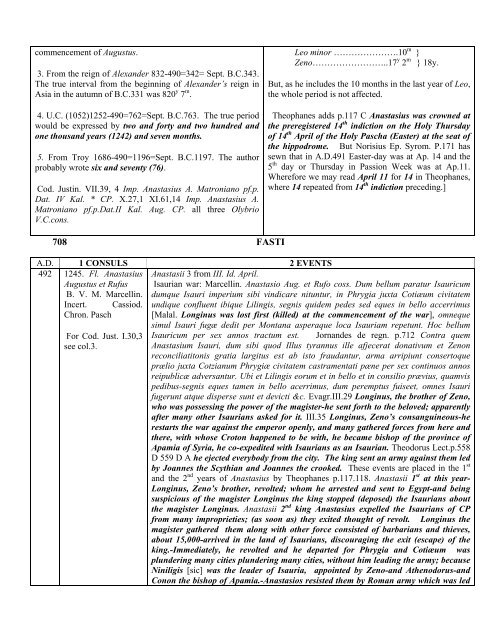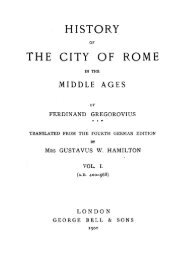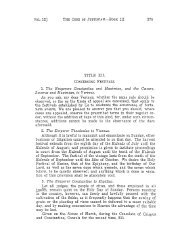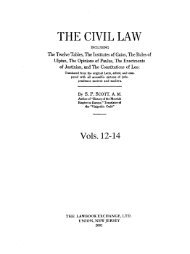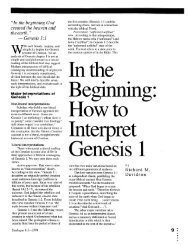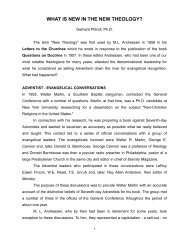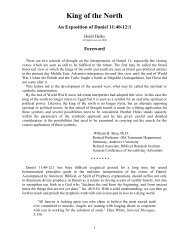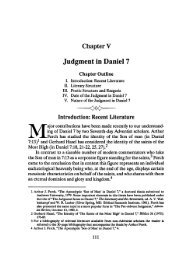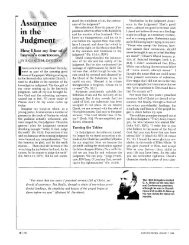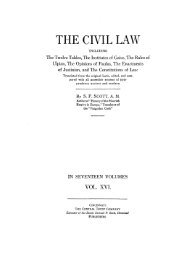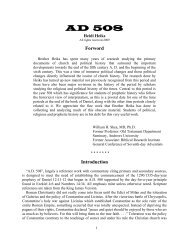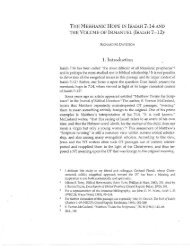FASTI ROMANI ROME AND CONSTANTINOPLE
FASTI ROMANI ROME AND CONSTANTINOPLE
FASTI ROMANI ROME AND CONSTANTINOPLE
You also want an ePaper? Increase the reach of your titles
YUMPU automatically turns print PDFs into web optimized ePapers that Google loves.
commencement of Augustus.<br />
3. From the reign of Alexander 832-490=342= Sept. B.C.343.<br />
The true interval from the beginning of Alexander’s reign in<br />
Asia in the autumn of B.C.331 was 820 y 7 m .<br />
4. U.C. (1052)1252-490=762=Sept. B.C.763. The true period<br />
would be expressed by two and forty and two hundred and<br />
one thousand years (1242) and seven months.<br />
5. From Troy 1686-490=1196=Sept. B.C.1197. The author<br />
probably wrote six and seventy (76).<br />
Cod. Justin. VII.39, 4 Imp. Anastasius A. Matroniano pf.p.<br />
Dat. IV Kal. * CP. X.27,1 XI.61,14 Imp. Anastasius A.<br />
Matroniano pf.p.Dat.II Kal. Aug. CP. all three Olybrio<br />
V.C.cons.<br />
708 <strong>FASTI</strong><br />
A.D. 1 CONSULS 2 EVENTS<br />
492 1245. Fl. Anastasius<br />
Augustus et Rufus<br />
B. V. M. Marcellin.<br />
Incert. Cassiod.<br />
Chron. Pasch<br />
For Cod. Just. I.30,3<br />
see col.3.<br />
Leo minor ………………….10 m }<br />
Zeno……………………..17 y 2 m } 18y.<br />
But, as he includes the 10 months in the last year of Leo,<br />
the whole period is not affected.<br />
Theophanes adds p.117 C Anastasius was crowned at<br />
the preregistered 14 th indiction on the Holy Thursday<br />
of 14 th April of the Holy Pascha (Easter) at the seat of<br />
the hippodrome. But Norisius Ep. Syrom. P.171 has<br />
sewn that in A.D.491 Easter-day was at Ap. 14 and the<br />
5 th day or Thursday in Passion Week was at Ap.11.<br />
Wherefore we may read April 11 for 14 in Theophanes,<br />
where 14 repeated from 14 th indiction preceding.]<br />
Anastasii 3 from III. Id. April.<br />
Isaurian war: Marcellin. Anastasio Aug. et Rufo coss. Dum bellum paratur Isauricum<br />
dumque Isauri imperium sibi vindicare nituntur, in Phrygia juxta Cotiæum civitatem<br />
undique confluent ibique Lilingis, segnis quidem pedes sed eques in bello accerrimus<br />
[Malal. Longinus was lost first (killed) at the commencement of the war], omneque<br />
simul Isauri fugæ dedit per Montana asperaque loca Isauriam repetunt. Hoc bellum<br />
Isauricum per sex annos tractum est. Jornandes de regn. p.712 Contra quem<br />
Anastasium Isauri, dum sibi quod Illus tyrannus ille afjecerat donativum et Zenon<br />
reconciliatitonis gratia largitus est ab isto fraudantur, arma arripiunt consertoque<br />
prælio juxta Cotzianum Phrygiæ civitatem castramentati pæne per sex continuos annos<br />
reipublicæ adversantur. Ubi et Lilingis eorum et in bello et in consilio prævius, quamvis<br />
pedibus-segnis eques tamen in bello acerrimus, dum peremptus fuiseet, omnes Isauri<br />
fugerunt atque disperse sunt et devicti &c. Evagr.III.29 Longinus, the brother of Zeno,<br />
who was possessing the power of the magister-he sent forth to the beloved; apparently<br />
after many other Isaurians asked for it. III.35 Longinus, Zeno’s consanguineous-he<br />
restarts the war against the emperor openly, and many gathered forces from here and<br />
there, with whose Croton happened to be with, he became bishop of the province of<br />
Apamia of Syria, he co-expedited with Isaurians as an Isaurian. Theodorus Lect.p.558<br />
D 559 D A he ejected everybody from the city. The king sent an army against them led<br />
by Joannes the Scythian and Joannes the crooked. These events are placed in the 1 st<br />
and the 2 nd years of Anastasius by Theophanes p.117.118. Anastasii 1 st at this year-<br />
Longinus, Zeno’s brother, revolted; whom he arrested and sent to Egypt-and being<br />
suspicious of the magister Longinus the king stopped (deposed) the Isaurians about<br />
the magister Longinus. Anastasii 2 nd king Anastasius expelled the Isaurians of CP<br />
from many improprieties; (as soon as) they exited thought of revolt. Longinus the<br />
magister gathered them along with other force consisted of barbarians and thieves,<br />
about 15,000-arrived in the land of Isaurians, discouraging the exit (escape) of the<br />
king.-Immediately, he revolted and he departed for Phrygia and Cotiæum was<br />
plundering many cities plundering many cities, without him leading the army; because<br />
Niniligis [sic] was the leader of Isauria, appointed by Zeno-and Athenodorus-and<br />
Conon the bishop of Apamia.-Anastasios resisted them by Roman army which was led


